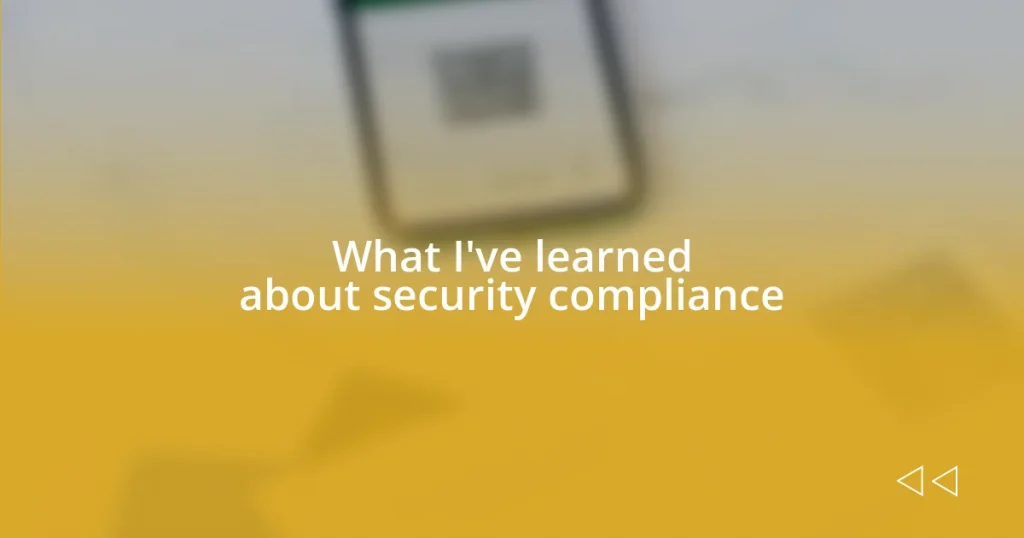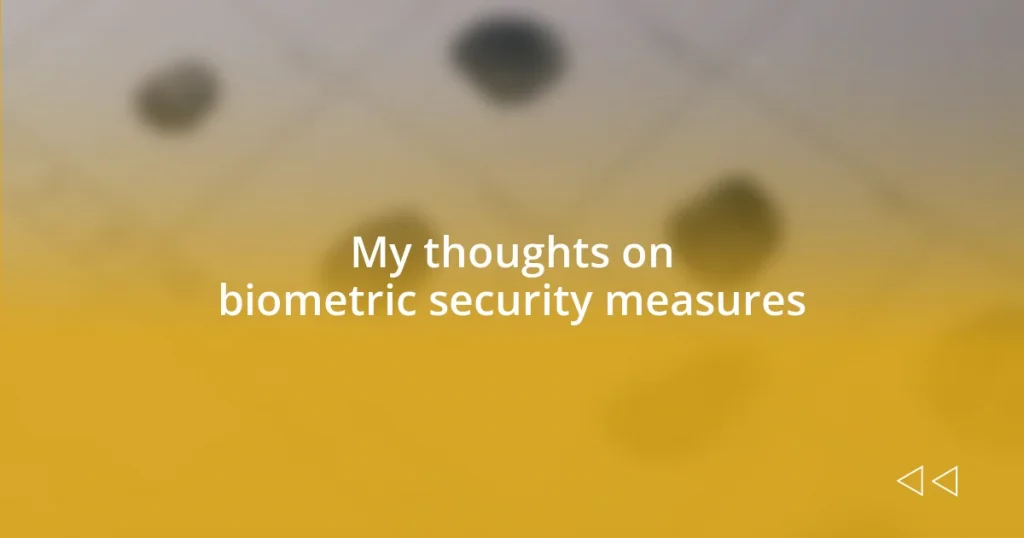Key takeaways:
- Smart contracts enhance efficiency, transparency, and trust in supply chain management by automating transactions and minimizing human error.
- Key challenges to implementing smart contracts include interoperability issues between different blockchain systems, legal uncertainties regarding enforceability, and a lack of skilled personnel for development and management.
- Future trends in smart contracts may involve AI and IoT integration, with potential for decentralized finance (DeFi) to lower transaction costs and increase market accessibility.
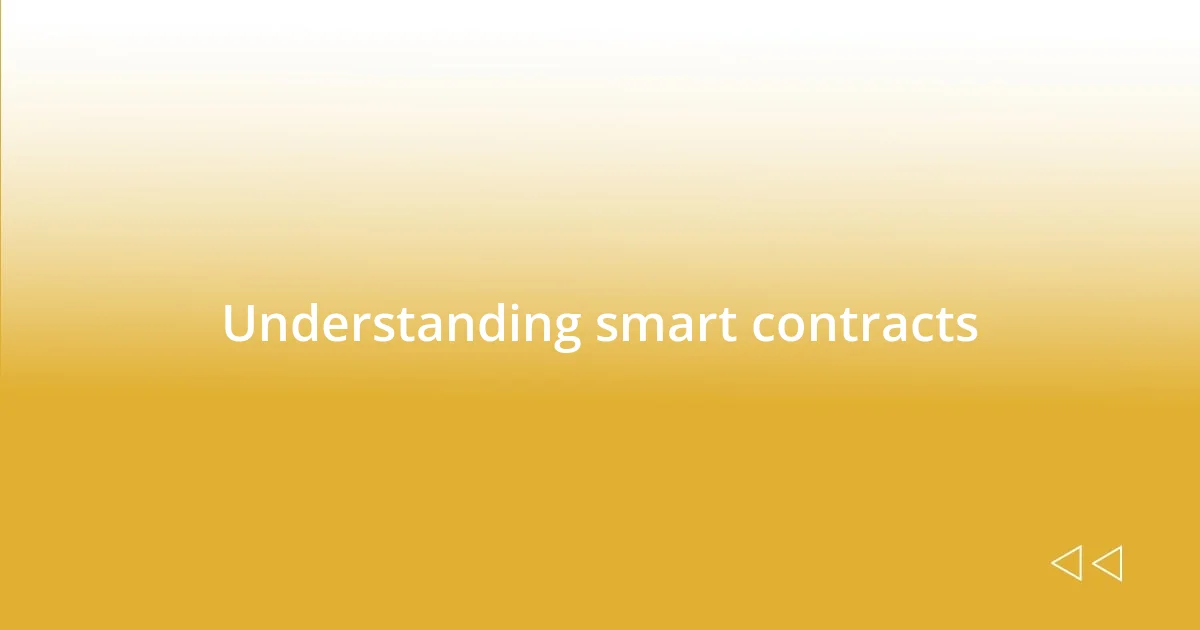
Understanding smart contracts
Smart contracts are self-executing contracts with the terms of the agreement directly written into code. I remember my first encounter with this concept—at first, it seemed almost like science fiction. Could we really replace traditional contracts with something that runs automatically? It felt revolutionary yet daunting, as I pondered whether people would trust such technology to handle critical transactions.
What fascinates me the most is how smart contracts operate on blockchain technology, ensuring transparency and security. Imagine a scenario where a supplier ships goods, and the payment is released only once the recipient confirms delivery. It’s like having a reliable third party without the costs associated with them! This level of automation reduces human error and builds trust between parties in a way I never thought possible.
Then there’s the flexibility of smart contracts; they can be designed to handle various conditions and stipulations. Have you ever found yourself in a lengthy negotiation over contract terms? I have, and it often feels like a tedious loop of back-and-forth revisions. With smart contracts, these terms become part of the automated process, potentially eliminating those frustrating delays. It’s an empowering thought—what if business transactions could be as simple as flipping a switch?

Benefits of smart contracts
One of the standout benefits of smart contracts is their ability to significantly enhance efficiency in supply chains. I recall a project where delays were frequent, causing frustration for everyone involved. With smart contracts, these delays could vanish. The automated execution of contracts means that once conditions are met, actions occur instantaneously without needing manual intervention. This not only saves time but also ensures that all parties remain focused on their core tasks rather than getting lost in the minutiae of contract management.
Here’s a quick look at the benefits I see with smart contracts in supply chain management:
- Increased Transparency: All parties have access to the same information, leading to better collaboration.
- Reduced Costs: By automating processes, companies can save money on administrative tasks.
- Minimized Human Error: Automation reduces the risk of mistakes that can arise from manual handling.
- Faster Transactions: With automatic execution, transactions can be completed in real-time, speeding up the supply chain.
- Improved Trust: Each party can verify conditions independently, fostering trust in the relationship.
This blend of efficiency and trust makes me excited about the future of smart contracts in supply chains. Every time I think about how frustrated I used to get over logistics snags, I can’t help but envision the potential smoothness smart contracts could bring.
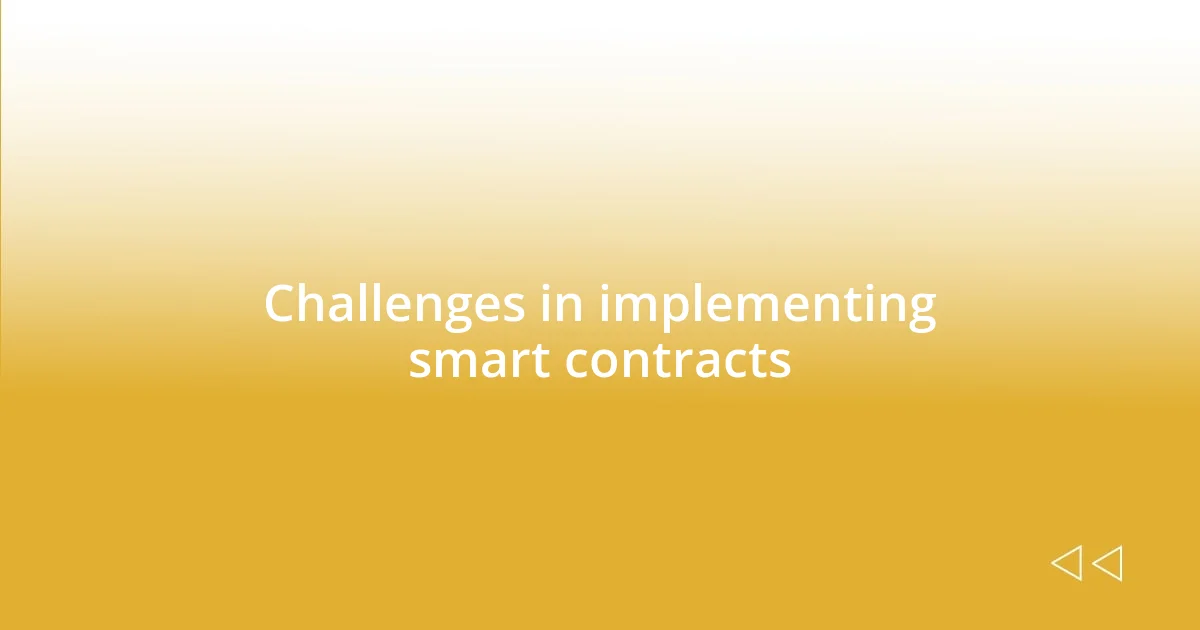
Challenges in implementing smart contracts
Implementing smart contracts in the supply chain is not without its challenges. One of the primary hurdles I encountered during discussions with industry experts is the issue of interoperability. Not all blockchain platforms are created equal, and when different systems must work together, it can become a tangled web of compatibility problems. I remember hearing a case study about a company that attempted to use smart contracts across multiple platforms but faced significant delays because the systems couldn’t communicate effectively. This is a stark reminder of the complexity involved in integrating new technology into existing frameworks.
Another significant challenge lies in the legal landscape. Although smart contracts aim to automate and streamline processes, many businesses still operate in a legal gray area regarding digital agreements. I’ve seen companies hesitant to fully commit because they worry about the enforceability of smart contracts in traditional courts. It’s frustrating to think that while the technology is ready, legal systems may not be. This disconnect can slow down adoption and create uncertainty about how disputes might be settled in the future.
Lastly, the technical skills needed to develop and manage smart contracts create a barrier. Many businesses simply lack personnel with the necessary blockchain expertise. I recall a tech firm that invested heavily in smart contract development only to realize they couldn’t find qualified developers. The irony of being unable to utilize cutting-edge technology due to a skills gap is not lost on me, and it emphasizes the importance of education and training in this field.
| Challenge | Description |
|---|---|
| Interoperability | Compatibility issues between different blockchain platforms can hinder effective integration. |
| Legal Concerns | Uncertainty about the enforceability of smart contracts in traditional legal frameworks slows adoption. |
| Skill Gap | Lack of personnel with blockchain expertise limits businesses’ ability to develop and manage smart contracts. |
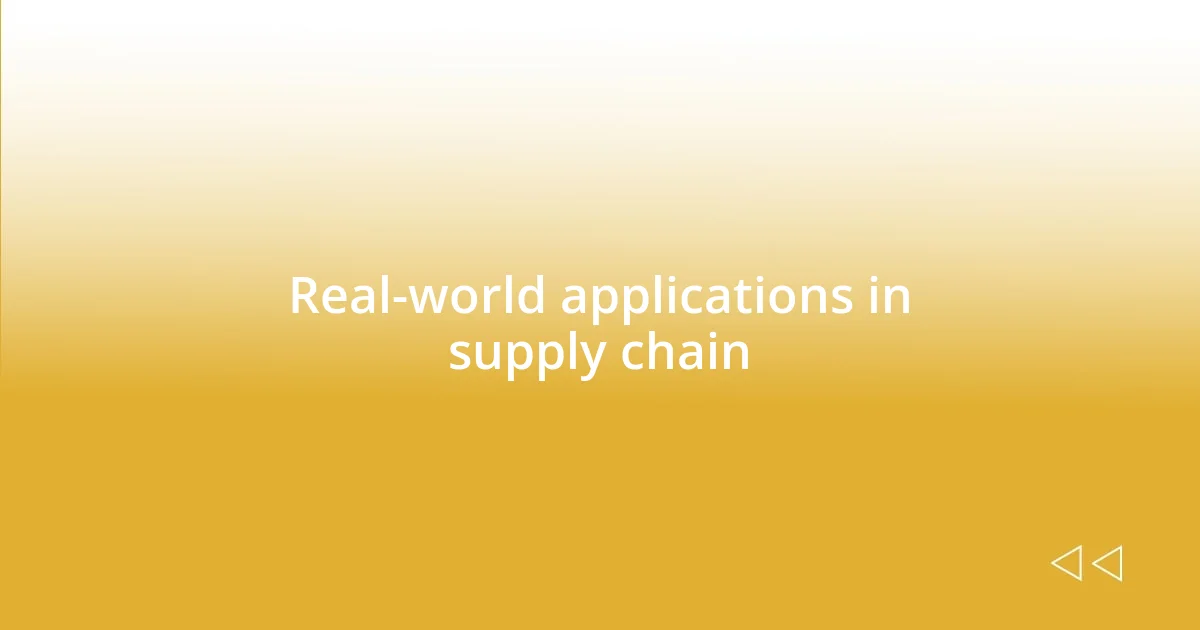
Real-world applications in supply chain
Real-world applications of smart contracts in supply chains are already making waves across various industries. I remember attending a logistics conference where a representative from a major shipping company shared how they implemented smart contracts to track shipments in real-time. They created a seamless communication line between suppliers, carriers, and retailers, where every party could see the same updates instantly. It was inspiring to see how reduced discrepancies led to smoother operations and happier customers.
Another fascinating example is in the agricultural sector. A farmer I know partnered with a blockchain startup that used smart contracts to ensure quality and payment verification. After each delivery of produce, the contract automatically released payment once the goods were verified by a third-party quality inspector. This not only strengthened trust between the farmer and retailers but also motivated the farmer to maintain higher quality standards. How empowering is that?
Moreover, the fashion industry is beginning to embrace smart contracts to combat counterfeiting. A designer brand I recently learned about is embedding digital tags with unique smart contracts that verify authenticity at each point in the supply chain. When customers scan the tag, they can access the product’s entire journey, fostering transparency and trust. It’s thrilling to see technology being leveraged in such innovative ways, ensuring consumers can confidently invest in genuine products while holding brands accountable. Isn’t it exciting to think about the future of transparency in the marketplace?

Case studies of smart contracts
One compelling case study involves a global automotive manufacturer that used smart contracts to streamline its spare parts procurement process. By integrating smart contracts into their supply chain, the company automated payments based on successful delivery confirmations. I vividly recall the excitement shared by their procurement team when they realized how much time they saved—what used to take days, now took minutes. Isn’t it remarkable how such technology can transform traditional processes?
In another instance, a pharmaceutical company sought to enhance its compliance with regulations around drug distribution. They decided to implement smart contracts that ensured each shipment met regulatory standards before payment was released. This effort not only improved compliance but also fostered a culture of accountability among suppliers. Reflecting on this experience, it’s amazing to think about the peace of mind it provides when you know that every transaction aligns with strict standards. Isn’t it empowering to be part of a system that values integrity?
A notable example from the food industry showcases how smart contracts can enhance traceability. A grocery chain adopted this technology to track the origin of their organic produce, enabling customers to see exactly where their food came from. During a recent visit to one of their stores, I noticed a mother scanning the QR code on a package with her child, explaining where the food originated. It warmed my heart to see that this technology not only informed but also educated the next generation about food sourcing. How impactful is it that technology can bring us closer to our food’s roots while building consumer trust?
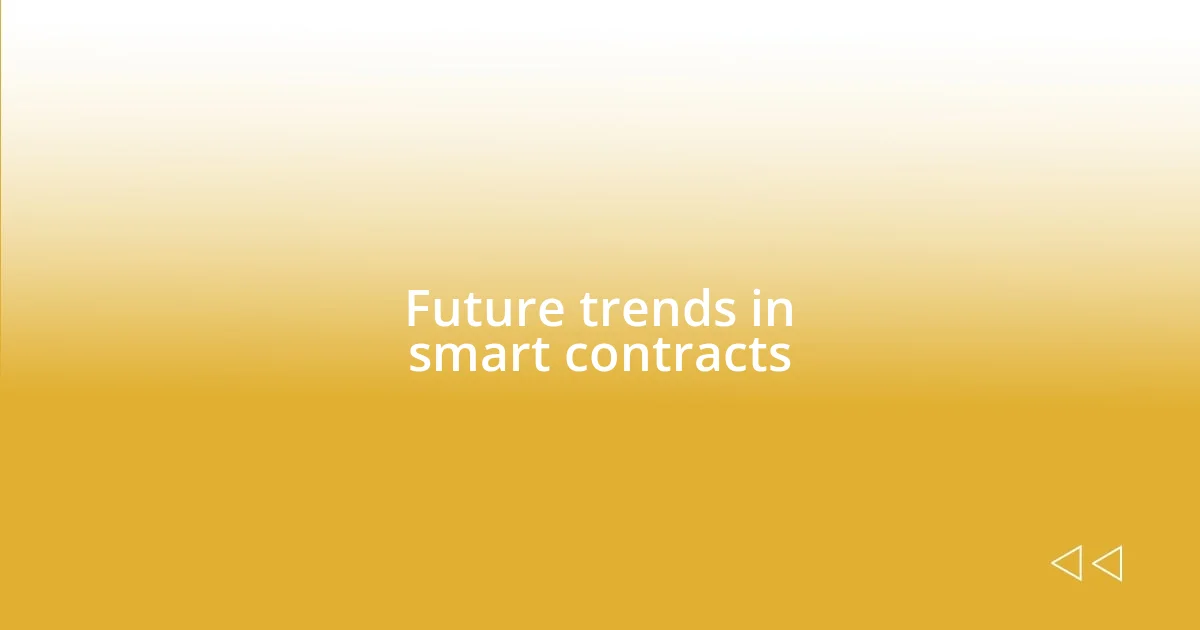
Future trends in smart contracts
The future trends in smart contracts are poised to revolutionize supply chain management in ways we’ve only begun to imagine. For instance, I recently read about advancements in artificial intelligence and machine learning that could supercharge smart contracts, allowing them to autonomously adapt to changing supply chain conditions. Just thinking about smart contracts that can analyze data in real-time and modify terms accordingly truly excites me. Wouldn’t it be incredible if these contracts could preemptively address issues like delays or price fluctuations without human intervention?
Moreover, I’m particularly intrigued by the potential use of IoT (Internet of Things) devices in conjunction with smart contracts. Imagine a scenario where trucks equipped with smart sensors automatically trigger payments upon reaching their destination, eliminating the need for manual confirmations. I can visualize how this synergy could streamline operations dramatically. The thought of removing errors linked to human oversight seems almost too good to be true. Isn’t it empowering to consider how such integration could lead to a more reliable and efficient system?
As we look ahead, the concept of decentralized finance (DeFi) is making its way into the conversation around smart contracts as well. I can’t help but wonder how this will reshape transactions across global supply chains. With DeFi protocols automating financial processes, we could see a dramatic reduction in transaction costs and an increase in accessibility for smaller players trying to compete in the market. The implications of such a shift are enormous—could we be on the brink of a supply chain renaissance that champions fairness and inclusivity? My mind races with possibilities, and I am eager to see where this journey takes us.
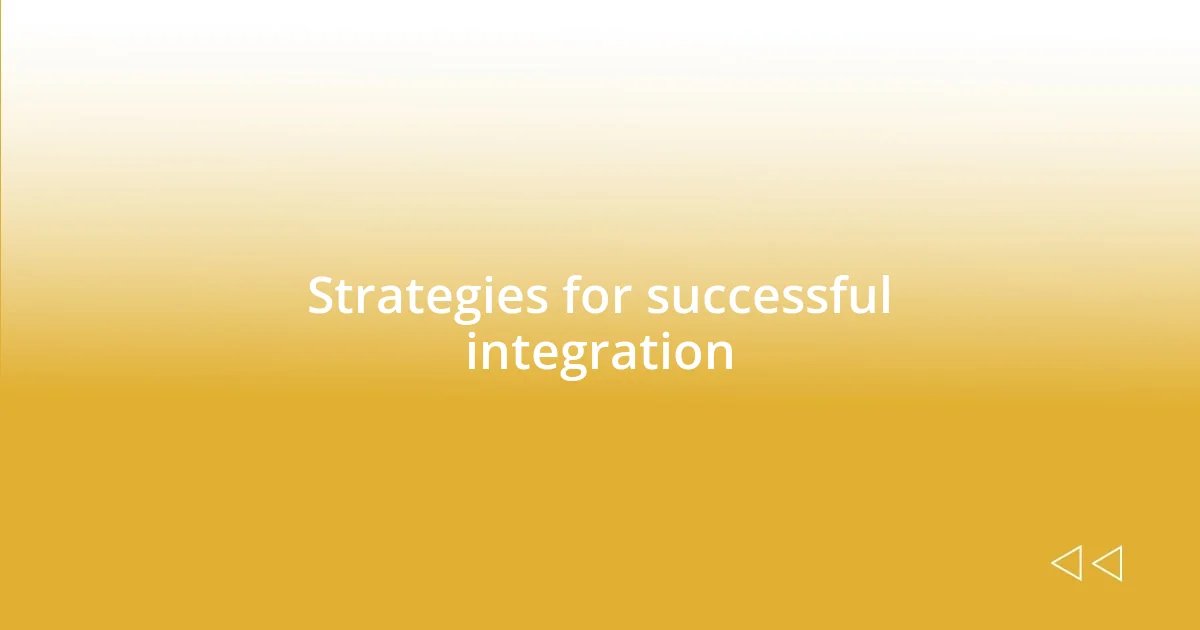
Strategies for successful integration
When integrating smart contracts into the supply chain, it’s vital to start with a clear understanding of your current processes. I once witnessed a logistics team huddled around a whiteboard, mapping out every step from sourcing to delivery. It’s a labor-intensive task, but this clarity revealed significant bottlenecks, which ultimately informed where smart contracts could be most effective. Have you ever taken a moment to dissect your workflow? It’s amazing how such insights can shape the entire integration strategy.
Education and training are also imperative for successful adoption. I remember speaking with a company’s IT staff who were initially overwhelmed by the concept of smart contracts. Through dedicated training sessions and hands-on workshops, they started to view these contracts not just as a tech add-on, but as a powerful tool in their arsenal. How often do we underestimate the importance of knowledge? Empowering your team can be the key to unlocking the full potential of these innovations.
Lastly, fostering collaboration with all stakeholders cannot be overstated. In one project I was involved in, we organized a joint meeting with suppliers, logistics partners, and technology experts to openly discuss expectations and challenges regarding smart contracts. The conversations that emerged were filled with optimism, and it’s incredible how shared visions can drive initiative. Isn’t it fascinating how collaborative efforts often lead to solutions that might not have surfaced in isolation?













